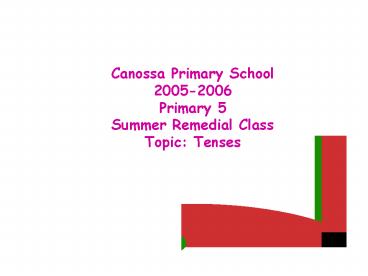Canossa Primary School - PowerPoint PPT Presentation
1 / 67
Title:
Canossa Primary School
Description:
e.g. He was watching TV when the telephone rang. The children were playing football. ... a great. trip tomorrow. will have. had. have been. Bravo! Try again! ... – PowerPoint PPT presentation
Number of Views:118
Avg rating:3.0/5.0
Title: Canossa Primary School
1
Canossa Primary School 2005-2006 Primary 5 Summer
Remedial Class Topic Tenses
2
1. Simple Present Tense We use simple present
tense when we are talking about our thoughts and
feelings at the present moment. e.g. My dad works
in Japan. Jimmy lives in Kowloon. I
love dancing. - truths e.g. The sun rises in
the east. Water boils at 100 Degree
Celsius. - regular or habitual actions e.g. I get
up at six o clock. Susan goes to school by
bus. NOTE Subjects like I / We / You / They
simple verb Subjects like He / She / It verb
s or es KEYWORDS usually / always / often
/ never
3
2. Present continuous We use present continuous
when we are talking about something that is
happening at the moment you are speaking. e.g. I
am playing computer games. She is watching
TV. They are singing happily.
NOTE -Subject I am (verb)ing -Subjects
like He / She / It is (verb)ing -Subjects like
We / You / They are (verb)ing KEYWORDS now
/ at this moment / at present / Help / Watch out
4
3. Simple Past We use simple past tense when we
are talking about something happened in the
past. e.g. I went to the supermarket last night.
May played the piano yesterday. Mum
cooked dinner yesterday.
- NOTE
- - regular verbs ed at the end of verbs
- e.g. play played, cook- cooked, watch watched
- irregular verbs verbs may change totally
- e.g. run ran, do did, go went
- - verb-to-be like am/is-was, are-were
5
4. Past continuous We use past continuous when we
are talking about continued actions which
occurred in the past. e.g. He was watching TV
when the telephone rang. The children were
playing football. NOTE -Subjects like I / He /
She / It was (verb)ing -Subjects like We / You
/ They were (verb)ing KEYWORD at that
moment / when / while
6
5. Future Tense We use future tense when we are
talking about what is likely to happen in the
future. e.g. I will go to the park. May
will go to Japan during summer holiday.
The children will have lunch at twelve
fifteen. NOTE Subject will simple
verb KEYWORDS tomorrow / next / very soon / soon
7
6. Present Perfect Tense We use present perfect
tense when we are talking about something
happened in the past, which exists in the
present. e.g. I have collected stamps for three
years. Miss Ko has taught English for ten
years. NOTE Subjects like I / You / We / They
have p.p. Subjects like He / She / It has
p.p. HINTS go(simple present) went(simple past)
gone(past participle)
8
- 1. My brother _______ (help) me lift
- up a heavy box yesterday.
helps
will help
helped
9
Good
10
Try again!
11
2. Mr Lee _______ (come) to my home tomorrow
night.
came
comes
will come
12
Very Good
13
Sorry! Try again!
14
3. Cats _______ (have) a lot of fur.
has
have
had
15
Well done!
16
Try again!
17
- 4. The two boys _________ (fight)
- with each other last night.
have fought
fight
fought
18
Excellent!
19
Try again!
20
- 5. The children _________ (feed)
- ducks in the pond now.
was feeding
are feeding
is feeding
21
Outstanding!
22
Try again!
23
- 6. Please _______ (bring) your
- coloured pencils to school tomorrow.
bought
brought
bring
24
Bravo!
25
Try again!
26
- 7. The students ________ (enjoy)
- the picnic very much last month.
have enjoyed
enjoy
enjoyed
27
Good job!
28
Try again!
29
- 8. There ________ (be) many
- flowers in spring.
has
have
are
30
Good
31
Try again!
32
- 9. It _______ (rain) soon.
rained
will rain
rains
33
Very Good
34
Try again!
35
- 10. When he _______ (cook) in the
- kitchen, Mary was setting up the
- table.
was cooking
is cooking
cooked
36
Well done!
37
Try again!
38
- 11. We _______ (have) fish and
- steak for breakfast this morning.
have
will have
had
39
Excellent!
40
Try again!
41
- 12. I _______ (see) him this coming
- Sunday.
saw
see
will see
42
Outstanding!
43
Try again!
44
- 13. We ________ (wake) up very
- late last week.
have waken
woke
woken
45
Bravo!
46
Try again!
47
- 14. He usually ________ (go) to
- school by bus.
goes
went
go
48
Good job!
49
Try again!
50
- 15. He _______ (write) a letter in
- his room now.
writes
is writting
is writing
51
Good
52
Try again!
53
- 16. People _______ (travel) by
- rickshaw or bicycle in the past.
have travelled
travel
travelled
54
Very Good
55
Try again!
56
- 17. We _______ (buy) a private flat
- ten years ago.
brought
bought
bringed
57
Well done!
58
Try again!
59
- 18. She _______ (live) in Australia
- for 15 years.
has lived
is living
lived
60
Excellent!
61
Try again!
62
- 19. We left Hong Kong yesterday and
- ______ (fly) to England.
have flown
flew
flied
63
Outstanding!
64
Try again!
65
- 20. I hope I _______ (have) a great
- trip tomorrow.
will have
had
have been
66
Bravo!
67
Try again!































